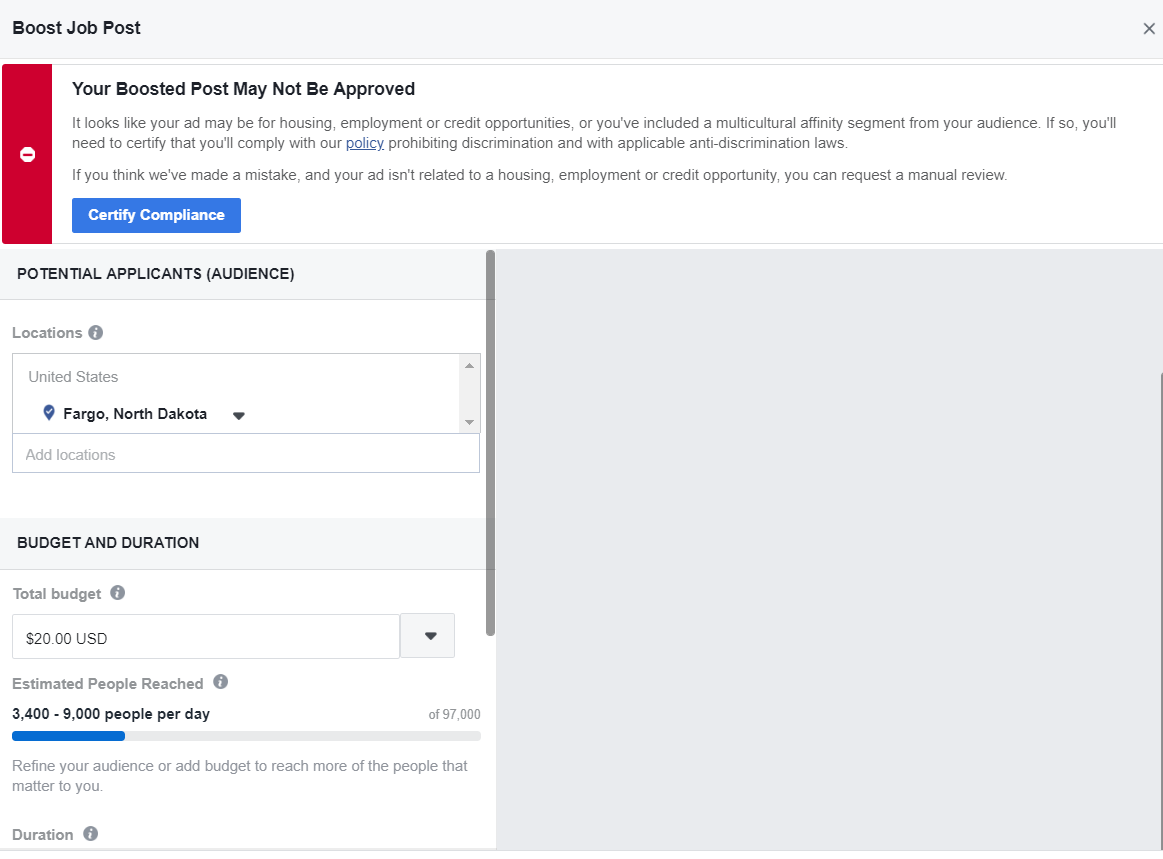
The jobs on Facebook feature provides employers a seamless way to communicate job openings and reach potential talent on a platform with over 2 billion users. Even though LinkedIn remains the primary professional networking site, Facebook’s job feature is becoming key for both recruiters and potential employees.
Usually, a new social media feature means users have a new tool to figure out how to use from a technical standpoint, but when using it to recruit and hire new employees, ethical considerations get added to the learning curve.
Let us walk you through how to use the tool – both practically and ethically.
What exactly is this feature?


By posting an opening with this tool, users can easily click the “Apply Now” button, which automatically sends their applications to the page administrator. Only admins have the ability to post positions, review applications, and contact applicants via Messenger.
Below is an example of a standard open position post:

Admins also have the option to further the post’s reach by boosting, (paying for it to appear in the algorithm of a manually segmented audience). Facebook has implemented a policy to limit targeting audience by age or gender demographics, a feature that has cut down on discrimination concerns.
The job boosting process:
If you decide to put a few dollars toward your job listing, Facebook will only allow you to target your audience based on geographic region. When creating the post, you are given the ability to customize the following:
- Location of applicants
- Total budget for boost
- Duration of boost

As shown above, there are no demographic options to choose from in this view. Facebook is also clear in displaying their job discrimination policy.

What to consider:
This feature seems great, right? A simple place for employers and employees to connect on Facebook… what could go wrong? Discrimination occurs when companies post their new positions in a standard Facebook post and pay to boost it to certain demographics. The process for boosting a standard post is not unlike any other, meaning that you can target your audience based on a plethora of demographic data (like age and gender).
On December 20, 2017, the Communication Workers of America (CWA) sued T-Mobile, Amazon, and Cox Communications for age discrimination via age-targeted posts on Facebook.
Aside from the obvious ethical repercussions, marketers need to be made aware of the Communications Decency Act (CDA). This legislation was implemented in 1996 in an effort to limit policing of the internet.
The act has been used by websites time and time again as a defense to lawsuits. Many lawyers interpret the act as stating that a website is not responsible for content that a third-party user posts. In some ways this makes sense, right? Mark Zuckerberg can’t possibly appear in court every time a minor posts a picture of alcohol on Facebook. With that being said, companies need to be aware of the facts:
- Targeting job listings to only specific demographics is illegal.
- Facebook will not be held responsible.
- Individuals affected have the rights to sue.
Since 2017, there have been multiple cases of companies wrongly using Facebook to discriminate in their hiring processes. Ifeoma Ajunwa, a lawyer and sociology professor at Cornell University, argues that social media is making discrimination easier for companies because those liable can hide behind a screen.
“The same types of discrimination issues that you would see in traditional hiring are now just being transferred over to the platforms.” -Ifeoma Ajunwa, Cornell University
The age of social media as a professional recruitment tactic is upon us. Let’s set the tone by fairly using the platform.
Ethically (and logically) speaking, companies should never segment their job applicants with the use of discrimination, and many large corporations have already caught fire for doing just that. The best way to search for talent on Facebook is to utilize this new, free feature and stream applications directly to those hiring.
Need help with recruitment for your company? We can’t wait to help! Contact us today.

Libby Bahr
Libby joined Flint Group as a social media and public relations intern in 2018. She has experience in content creation, social media implementation and copywriting for clients across various industries, including professional services, manufacturing and retail. She was promoted to join the social media team full-time upon her graduation from NDSU in 2020. Through her range of experience, Libby has developed expertise in social media tactics and copywriting. She plays a key part in implementing and coordinating Flint Group's social media services.
